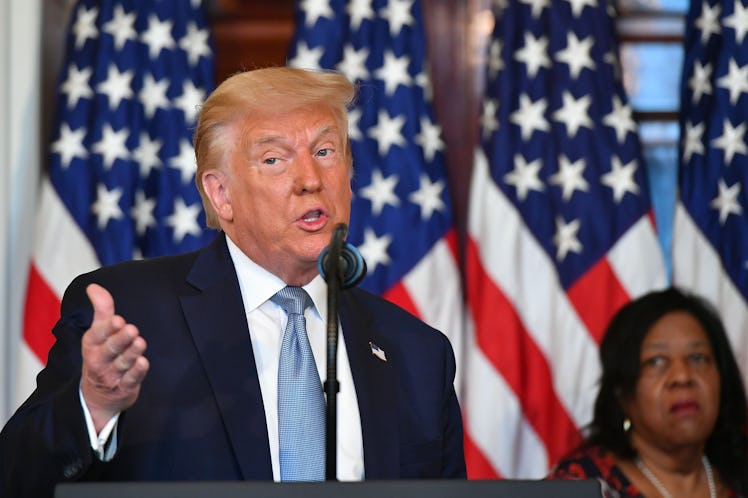
Here's Why People Are Calling Out Trump's Susan B. Anthony Pardon
Another Trump pardon is facing scrutiny, but it's not for a reason you might think. On Tuesday, Aug. 18, President Donald Trump marked the 100th anniversary of the ratification of the 19th Amendment by posthumously pardoning Susan B. Anthony, one of the women's suffrage movement's best-known activists. In the 1872 U.S. presidential election, Anthony illegally voted (because she was a woman, as women didn't get the legal right to vote until 1920), and was fined $100 for her act of resistance. Trump's announcement on Tuesday wasn't met with full support, and these tweets about Trump pardoning Susan B. Anthony question whether the suffragette would've welcomed a pardon if she were still alive.
During a ceremony at the White House on Tuesday celebrating the ratification of the 19th Amendment, which granted women the right to vote — though it effectively applied only to white women, and left out Black, Indigenous, and other women of color — Trump announced his decision to pardon the voting rights pioneer. "She was guilty for voting, and we are going to be signing a full and complete pardon. And I think that’s really fantastic. She deserves it," Trump said during the event, before turning to address women leaders standing behind him. "What took so long?"
Anthony stood trial in June 1873, and she was found guilty for voting as a woman during the November 1872. Anthony never paid her fine, calling it an "unjust claim." Her lawyer, Henry Selden, submitted the argument to the jury that she was innocent because she believed she had a legal right to vote like any citizen. During one of her most famous speeches, Anthony maintained her innocence and said she'd been unjustly sentenced.
At her sentencing hearing in 1873, Anthony told the jury and the judge, "May it please your honor, I shall never pay a dollar of your unjust penalty ... And I shall earnestly and persistently continue to urge all women to the practical recognition of the old revolutionary maxim, that 'Resistance to tyranny is obedience to God.'"
Due to Anthony's belief that she hadn't been guilty of any crime, a number of Twitter users pointed that Anthony, who died in 1906, not only wouldn't need a formal pardon in the year 2020, but that she also likely wouldn't want one. Shortly after the announcement, Lt. Gov. Kathy Hochul of New York tweeted, "She was proud of her arrest to draw attention to the cause for women’s rights, and never paid her fine. Let her Rest in Peace."
Others also took issue with the fact that President Trump spent the rest of the ceremony lambasting mail-in voting. "You have to get voting right" Trump said, claiming the election would be rigged if there was universal mail-in voting available. "You can’t have millions and millions of ballots sent all over the place, sent to people that are dead, sent to dogs, cats."
Twitter users couldn't look past the irony of Trump peddling vote-by-mail fraud theories at a ceremony celebrating women being granted the right to vote.
With the Republican National Convention scheduled for Monday, Aug. 24, it's likely the president will continue to address mail-in voting and other issues on his agenda in the coming days. As for any other surprise pardons, you'll have to wait and see.
This article was originally published on